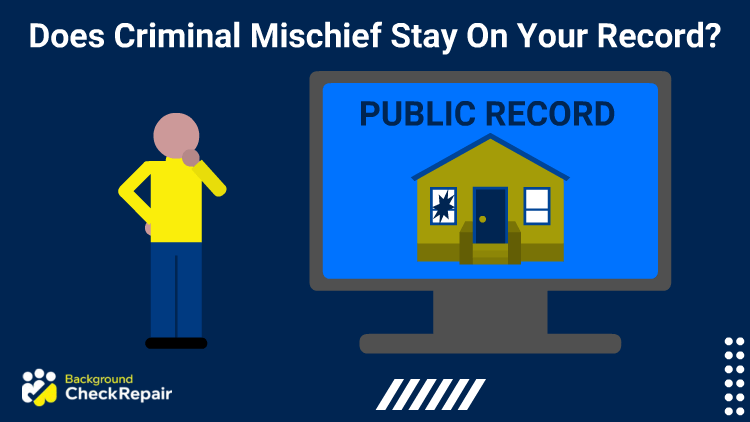
Many individuals who have been charged with vandalism or similar crimes may be wondering does criminal mischief stay on your record.
One important thing to remember in this situation is how the $1000 rule works.
Generally, if an individual commits more than $1000 worth of damage the charge will be raised to a felony, and anything under $1,000 will be considered a misdemeanor.1
Regardless of the level of the charge, the answer to does criminal mischief stay on your record is that it will for at least 7 years in most states unless you follow the process for an expungement or live where misdemeanors are removed from public record searches (background checks) after a shorter time period.
Keep reading to learn more.
Does Criminal Mischief Stay on Your Record?
Many people wondering: does criminal mischief stay on your record may have heard that certain crimes, such as low-level misdemeanors do not appear on your record. However, this is not the case, all charges that are filed, regardless of the severity of the charge or if the charges result in a conviction, will appear on a criminal history check.
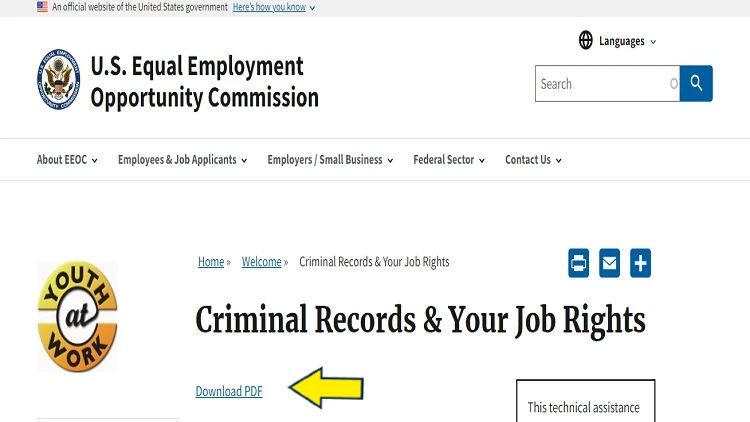
Employers must follow specific employee rights concerning the use of criminal records for background checks, which protect previously convicted people from discrimination.
The only way to get a criminal mischief charge off of your record is to go through the process of having the record sealed or expunged.2 This is a fairly difficult process and will rely on state law if it is at all possible. However, this can be a great option as sealing criminal records will make them invisible to background check companies that are conducting criminal history checks.
Will Criminal Mischief Show Up on a Background Check?
Some individuals who have a background check coming up may be wondering: Will criminal mischief show up on a background check? The vast majority of background checks performed for employment3 purposes will be able to find all criminal charges and convictions a person has on their record. This will include criminal mischief as well as any other misdemeanor charges.
One of the few things that will not appear on a background check is traffic infractions. Since these are only infractions and are not considered crimes, they will not show up on a criminal history check and will only appear on DMV records. However, anything above the level of infraction, even low-level misdemeanors, will appear on a background check.
Individuals who want to know exactly what is on their background check can always perform a background check on themselves using the search bar at the top of this page.
What Happens if You Get Charged With Criminal Mischief?
The legal process can be confusing at the best of times and many individuals will want to know what happens if you get charged with criminal mischief. Assuming the criminal mischief was only a misdemeanor-level offense, rather than a felony, once charges are filed the individual will likely receive a criminal summons in the mail or in person.
This summons will contain information on the files that were charged as well as a court date that the individual must attend in order to have the charges brought and for the individual to make a guilty or not guilty plea.
Individuals should contact an attorney as soon as possible after receiving a criminal summons as they will be a massive help when it comes to the first hearing in front of a judge and for the rest of the criminal proceedings.
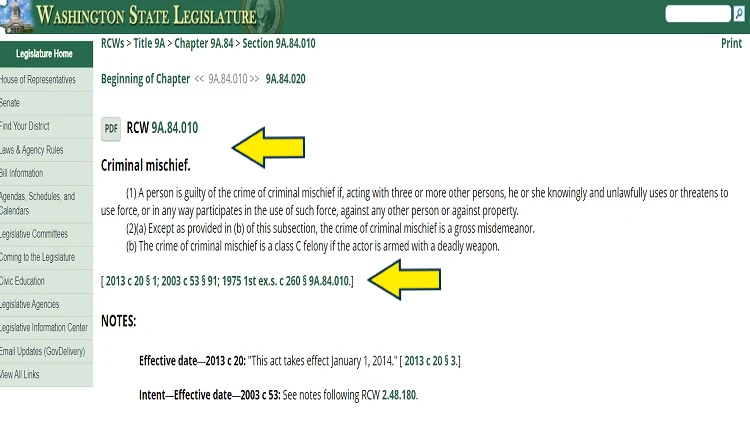
Each state has its own definition of criminal mischief, and some states lower the amount for felony charges to under $1000.
If the individual chooses to plead guilty, the criminal proceedings will then move into the sentencing phase. If the individual pleads not guilty then the proceedings will move toward a jury trial that will decide if the individual is guilty or not guilty.
Can Criminal Mischief Charges Be Dropped?
Many people will have heard that it is possible for certain criminal charges to be dropped before any real criminal proceedings occur and will be wondering: can criminal mischief charges be dropped? Any and all criminal charges can be dropped at any time during the criminal proceedings if there is sufficient reason for them to be dropped.
Charges can be dropped for a variety of reasons but most cases are dropped due to a lack of evidence or procedural issues involving the arrest or investigation. Of course, these are not the only reasons for charges to be dropped. It is always a good idea to have an attorney so that they can view the facts of the case and determine if there is cause for the case to be dismissed.
How To Beat a Criminal Mischief Charge
Those wondering how to beat a criminal mischief charge may be hoping for some kind of loophole they can rely on, unfortunately, no such loophole exists. Having an experienced attorney will be the best way to beat criminal mischief charges.
Every case is unique and a lawyer will be able to examine the case and determine the best course of action to minimize the impact of the charge on the individual’s life. In some cases, this may be seeking to get the case dropped entirely or to enter a plea deal for a reduced sentence.
Part of the reason that beating criminal mischief charges is so difficult is that it can be fairly difficult to prove. Since significant evidence is needed to get a conviction in a criminal mischief case, charges are only filed if significant evidence exists. This means that if charges are brought at all, it is likely because there is irrefutable evidence such as photos or video footage of the incident taking place.
How To Get Criminal Mischief Charges Removed
Many individuals wondering: does criminal mischief stay on your record, may not have even been convicted of the crime. Worrying about how criminal charges will affect your background check is extremely common and in most cases these worries are warranted. Having any kind of criminal activity show up on a background check can significantly impact job opportunities.
Many people in this situation will want to know how to get criminal mischief charges removed.
Although there is no method that is 100% reliable, the best method is to get the record sealed or expunged. The possibility of this will rely on a few factors, most notably the state law and whether or not the individual was convicted.
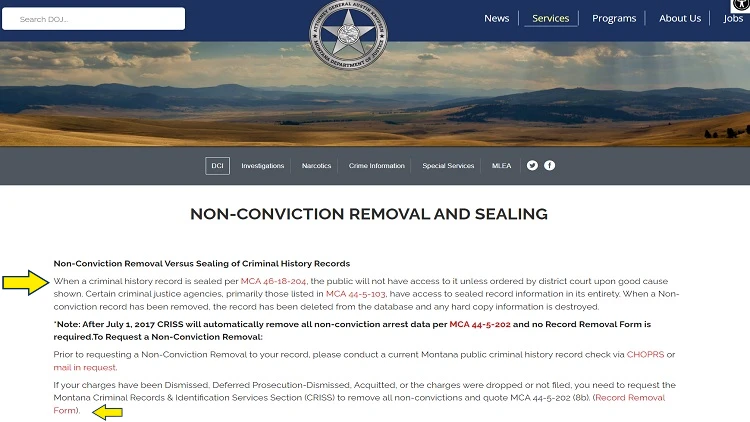
The expungement process is available in most states and is particularly designed to remove misdemeanors and some felonies from appearing on background checks.
If the individual was convicted, it is still possible to get a record sealed but it will generally be far more difficult, especially for repeat offenders. However, individuals whose charges were dropped will likely find the process much easier.
Is Criminal Mischief a Felony?
Criminal mischief is one of the vaguer criminal charges that can be brought against someone as the charge can refer to several different crimes and it can also be a misdemeanor or a felony. When it comes to the question: is criminal mischief a felony? The answer will depend on the extent of the damage.
In most states, misdemeanor criminal mischief charges will be filed against individuals who committed less than $1,000 in damage. For crimes that involve over $1,000 in damage, the charge will generally be raised to a felony level.
Criminal Mischief First Degree
Some states have distinctions between the different levels of criminal mischief that refer to the extent of the damage. Generally, criminal mischief first degree7 is the lowest of the criminal mischief charges. Although it varies, the first degree is usually used when the damage was valued between $200 and $1,000.
Criminal Mischief 2nd Degree
Criminal mischief 2nd degree is the charge that is brought when the damage is also between $200 and $1,000. Various other factors about the crime can raise it to the second degree which usually involves harsher penalties such as a higher fine and more jail time.
What Is Criminal Mischief 3rd Degree?
Since both first and second-degree criminal mischief involves crimes that amounted to under $1,000 in damage, many people will be wondering what criminal mischief in the third degree is. In most states, 3rd-degree criminal mischief will be a felony charge and will have the most severe punishments. This is generally used when over $1,000 in damages occurred as a result of the crime.
Criminal Mischief Examples
It is not uncommon for individuals to be confused about what constitutes criminal mischief. Some of the most common criminal mischief examples4 include the following crimes:
- Slashing the tires of another person’s car
- Graffiti of private property
- Breaking the windows on someone’s car or home
Most criminal mischief charges are a result of property damage that was carried out by the individual intentionally. This is a key aspect of the law as many incidents that cause property damage are the result of accidents and are usually not considered criminal mischief.
Criminal Mischief Punishment
The criminal mischief punishment will vary from state to state and is also based on the severity of the crime. As mentioned, the severity of the charge will depend on the total dollar amount of the damages that occurred.
In the most severe cases, felony criminal mischief can be punished by up to 5 years in state prison and fines of more than $50,000.
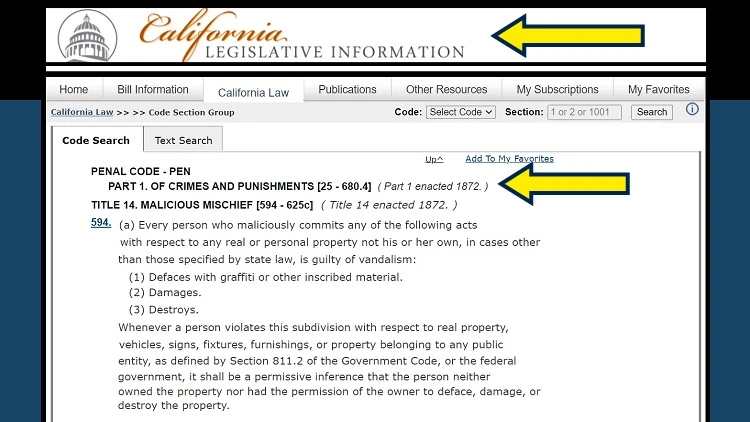
Every state has a penal code outlined for criminal activity, including criminal mischief.
Use the table below to learn more about the specific penalties for criminal mischief in each state. Keep in mind that the penalties involve situations in which only criminal mischief charges are brought; oftentimes there will be charges that are filed in addition to criminal mischief for the same incident.
How Long Does Criminal Mischief Charge Show Up on Your Record?
When it comes to how long criminal mischief charges show up on your record, the exact amount of time will depend on the state. However, in most situations, the charge will appear on an individual’s record forever.
The exception is when states have laws that limit how long certain criminal records are able to appear on background checks. For example, there are several states that limit background check companies to only report the last 7-10 years of criminal records to employers.
Many states also offer programs that allow individuals to seal or expunge past criminal records.
Does Criminal Mischief Stay on Your Record Without a Conviction?
Many individuals may have found that the charges filed against them were dropped and will be wondering: Does criminal mischief stay on your record without a conviction?
In general, charges will remain on an individual’s record regardless of whether or not they resulted in a conviction. However, it is significantly easier to seal criminal records that involve charges that were dropped or otherwise failed to result in a conviction.5
And, some states prohibit the inclusion of being charged without a conviction from appearing on employment background checks.
Getting charged with a crime can be scary especially when you are unsure of the long-term effects it could have on your career or other aspects of your life. Knowing the answer to questions like Doe’s criminal mischief stays on your record will allow individuals to better prepare for their future and any upcoming background checks.
Frequently Asked Questions About Does Criminal Mischief Stay on Your Record






